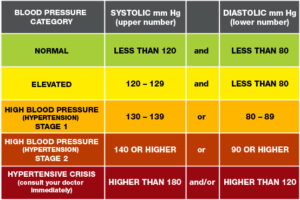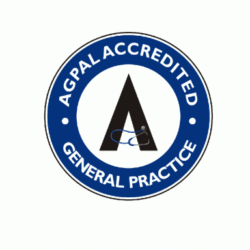Blood pressure is a measurement of the force placed on the walls of the blood vessels as blood is pumped around the body. It naturally varies throughout the day, depending on what your body is doing.
Blood pressure is highest when blood is pushed out of the heart into the arteries, and lower as it relaxes, when blood to make its way back to the heart via the veins.
A blood pressure reading is made up of two numbers – the systolic pressure and the diastolic pressure. These are expressed as a fraction e.g. 120/70 mmHg. It is measured very simply, using a piece of equipment called a sphygmomanometer. Measurements should be taken while you are relaxed.
The systolic pressure is a measurement of pressure when the heart is contracting (beating) and the diastolic pressure is a measure of pressure when the heart is resting (between beats).
A normal range blood pressure reading is under 120/80. Readings over 140/90 are considered high where readings under 90/60 are considered low. These ‘ideal’ figures do vary from person to person based on a number of wider factors, so your Doctor is the best person to advise you on your target reading.

The term ‘hypertension’ is used for persistent high blood pressure and the term ‘hypotension’ is used to describe low blood pressure.
Hypertension
Hypertension is a serious medical condition. If not controlled it can lead to hardening of the arteries, decreased blood & oxygen flow, heart attacks, strokes, kidney failure, heart failure and heart arrhythmias.
The World Health Organisation estimate that 1.13 billion people worldwide have hypertension and fewer than 1 in 5 of these have the problem under control. It is a major cause of premature death worldwide.
Hypertension often does not have any symptoms and many people are unaware that they have it until it is measured by their Doctor. Sometimes it may be a one-of high reading caused by stress. If high readings are recorded on several separate occasions, a diagnosis of hypertension is made. Your Doctor may also recommend a 24-hour blood pressure monitoring machine be fitted and worn to confirm the diagnosis.
While symptoms are often not present, some people do experience symptoms such as headaches, nosebleeds, palpitations, buzzing in the ears, fatigue, confusion, anxiety, visual changes and chest pain. If you regularly experience any of these symptoms, it would be wise to have your blood pressure checked.
Hypertension can be treated. There are a number of known risk factors that cannot be modified, such as family history, age and co-existing diseases such as diabetes that are linked to hypertension. However, there are a number of lifestyle factors that can be changed to help reduce blood pressure and avoid the need for life-long medication, such as:
- Reducing salt consumption to less than 5g per day
- Reducing trans and saturated fat intake
- Increasing fruit & vegetable intake
- Increasing physical activity
- Limiting consumption of alcohol
- Stopping use of tobacco
- Weight loss for the overweight and obese
- Reducing and managing mental and emotional stress
There are medications that are very effective in reducing blood pressure when taken as prescribed. They do not cure hypertension but help to control it. It is very important not to suddenly stop taking your medication without advice from your Doctor.
Some medications, or combinations of medication can also cause hypertension. This is why your Doctor will often require you to attend for an appointment for repeat prescriptions, to ensure that your blood pressure is well controlled.
Hypotension
Lower blood pressure is often a sign of good health and overall fitness. Hypotension is usually episodic and only considered a problem if it has a negative impact on your body or quality of life. It is often of concern in elderly people who are at higher risk of falls.
Symptoms of a hypotensive episode include:
- Light headedness
- Dizziness
- Blurry vision
- Pale, clammy skin
- Fatigue
- Fainting
Hypotension may be associated with an underlying health condition such as dehydration, pregnancy, pain, drug interactions, alcohol or illegal drug overdose, allergic reactions, infections and/or endocrine disorders.
Low blood pressure does not usually require treatment but if it is causing your problems, your Doctor may be able to suggest some precautions to take to prevent episodes.




